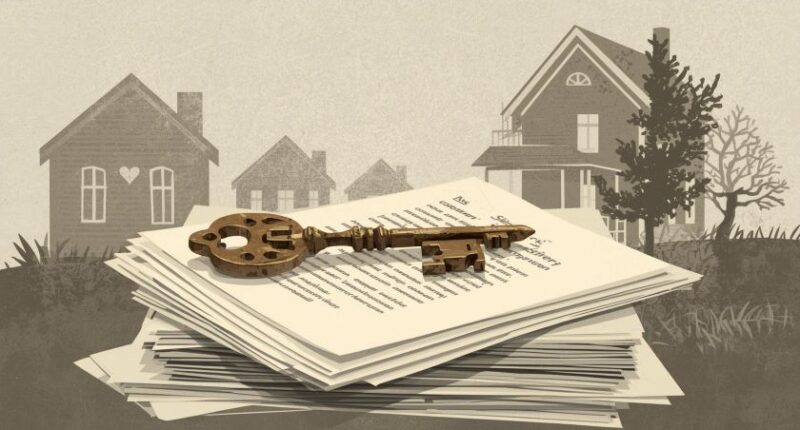Inheriting a home is often considered one of the most valuable legacies you can leave to your heirs. However, while it might feel like a blessing to pass on a piece of real estate, it’s important to remember that owning a home comes with substantial ongoing costs. Your heir might inherit more than just property — they could inherit significant financial burdens that could strain their finances or even prevent them from keeping the home at all.
If you’re considering leaving your home to a loved one, it’s important to understand the true cost of inheriting a home. This article explores the various expenses involved and helps answer the critical question: Can your heir afford to inherit your home?
The Financial Reality of Inheriting a Home
What Happens When You Inherit a Home?
Inheriting property can seem straightforward at first: your heir receives the title to your house, and they now own it. However, property inheritance is rarely simple. Depending on the circumstances, the new homeowner may face various expenses they might not have anticipated.
1. Property Taxes: The Hidden Expense
One of the first costs your heir will face after inheriting your home is property taxes. Every year, homeowners are required to pay taxes based on the value of the home. While some states offer tax exemptions or discounted rates for heirs inheriting a property, the majority of states will still require the new owner to pay property taxes on the inherited home.
-
Tax Variations by State: The amount of property tax varies widely depending on the state, county, and city where the home is located. In some areas, taxes can be high, significantly increasing the cost of homeownership.
-
Property Revaluation: If the property was inherited after a long period, its value may have appreciated considerably, which could result in a higher property tax bill.
The tax burden can catch heirs off guard, especially if the home was owned by someone who did not provide clear instructions on how to handle property taxes or how much they have increased over time.
2. Ongoing Maintenance Costs
While property taxes are a recurring expense, home maintenance is another long-term cost that can make owning a house a financial challenge for heirs. Older homes, in particular, may require significant investment in repairs or upgrades, including:
-
Roof repairs
-
HVAC system updates
-
Plumbing and electrical issues
-
Landscaping and exterior maintenance
If the home was well-maintained during the previous owner’s lifetime, the costs might not be as high. However, if it has fallen into disrepair or has major structural issues, your heir could face substantial costs in fixing these problems.
3. Homeowner’s Insurance: A Necessary Expense
Once your heir inherits your home, they will be responsible for obtaining homeowner’s insurance. This is necessary to protect the home from damage caused by accidents, fire, theft, or natural disasters. The cost of insurance varies depending on the value of the home, the coverage options, and the location of the property.
Homeowner’s insurance typically ranges from $500 to $2,000 per year but can be higher in areas prone to natural disasters (floods, hurricanes, etc.). This is an ongoing expense that can be a financial burden for some heirs, especially if they were not expecting such a high cost.
4. Mortgage Payments (If Applicable)
If the property is still mortgaged, your heir may inherit the mortgage debt along with the property. In some cases, the mortgage may be paid off at the time of inheritance through life insurance or other financial arrangements. However, if there is an outstanding balance on the mortgage, your heir will need to decide whether they want to take over the mortgage payments or sell the property.
-
Mortgage Interest: Even if your heir assumes the mortgage, they will still be responsible for paying the interest and principal.
-
Mortgage Assumption: Some heirs may not qualify to take over the mortgage, depending on their creditworthiness or the terms set by the lender.
In these situations, selling the home to pay off the mortgage may be the only option for heirs who cannot afford the monthly payments.
Can Your Heir Afford to Keep the Family Home?
1. Heir’s Financial Situation
The ability of your heir to afford your home depends largely on their financial situation. If your heir is already financially stable, they may have no problem absorbing the cost of property taxes, maintenance, and insurance. However, if they are struggling with their own debts or do not have a steady income, inheriting a home could create financial stress.
Here are some factors to consider:
-
Income: Does your heir have a stable job or source of income to cover the ongoing costs of the home?
-
Debt: If your heir is already in debt, inheriting a home could push them further into financial difficulty.
-
Other Assets: Does your heir have other assets that could help them absorb the cost of homeownership, such as savings or investments?
2. The Option to Sell or Rent the Property
If your heir is unable to afford to keep the home, selling or renting the property might be the best option. Selling the home could allow them to pay off any remaining mortgage and other associated costs while retaining any profit from the sale. Renting the property could provide them with steady income to cover the expenses.
However, both options come with their own challenges:
-
Selling the home may be emotionally difficult, especially if the home holds sentimental value for your heir.
-
Renting the property requires additional time, effort, and financial investment to manage tenants and maintain the property.
Minimizing the Financial Burden for Your Heir
As a parent or grandparent, there are steps you can take to minimize the financial burden on your heirs when they inherit your home. Consider the following options:
1. Pre-Pay Property Taxes
If possible, you can work with your heir to pre-pay property taxes or ensure there is enough liquid cash in a trust to cover these expenses.
2. Provide a Financial Cushion
Consider setting up a life insurance policy or a trust fund to help your heir manage the costs associated with the property. This could provide them with the necessary financial resources to cover the taxes, maintenance, and other fees after inheriting the home.
3. Discuss Your Plans
Have open conversations with your heir about your plans for the property. This can help them prepare for any future costs and avoid any surprises. If they are unable or unwilling to keep the home, you can work together to find a solution — whether that’s selling the house, renting it, or using the proceeds from the sale for their benefit.
Conclusion: Will Your Heir Be Able to Afford Your Home?
While inheriting a home can be a tremendous gift, it’s essential to consider the true costs associated with property ownership. From property taxes to maintenance, insurance, and mortgage payments, the financial burden can be significant. It’s crucial for both you and your heirs to understand these expenses and plan accordingly.
As a property owner, you can take steps to prepare your heirs for the responsibilities of homeownership. Open communication, financial planning, and careful consideration of your heir’s ability to manage the home will ensure that your legacy is a blessing — not a financial burden.
By thinking ahead, you can make the process of inheriting a home as smooth as possible for your loved ones.









